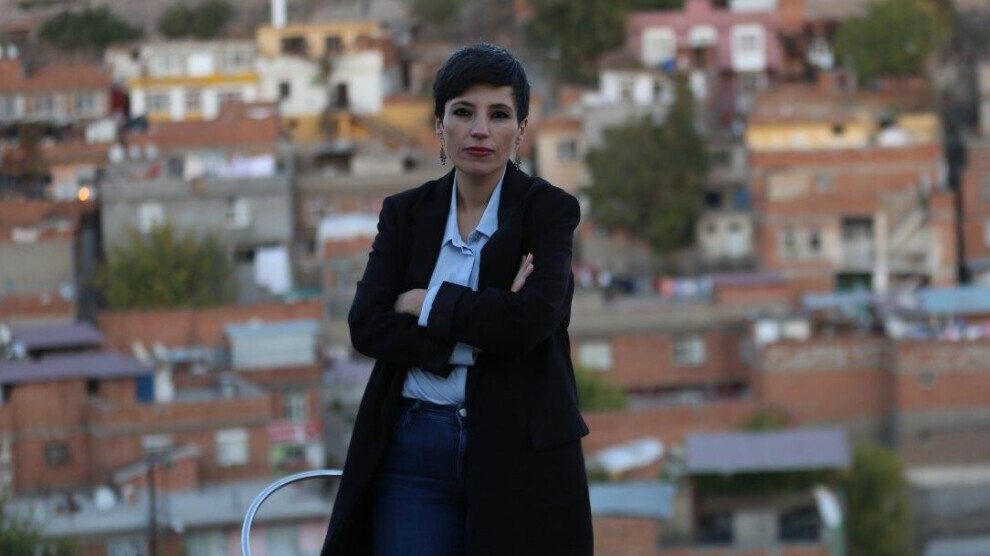Journalist Dicle Müftüoğlu remains in prison
Kurdish journalist Dicle Müftüoğlu, an editor of the Mezopotamya news agency (MA), who has been behind bars since May, faces up to 15 years in prison.
Kurdish journalist Dicle Müftüoğlu, an editor of the Mezopotamya news agency (MA), who has been behind bars since May, faces up to 15 years in prison.

Journalist Dicle Müftüoğlu will remain in prison, ruled a Turkish criminal court in Amed (tr. Diyarbakır) in a hearing held on Thursday. The court board rejected a request by her lawyers to lift the arrest warrant and release the Kurdish journalist who is wrongly accused of terrorism.
Dicle Müftüoğlu, who works as an editor for the news agency Mezopotamya (MA) and is co-chair of the Dicle Fırat Journalists' Association (DFG), has been in custody in Sincan Women's Prison in Ankara since May on suspicion of founding and leading a terrorist organisation and alleged membership of it. Her lawyers, including Resul Temur, Veysel Ok and Emine Özarslan, argue that the accusations against the journalist are related to her work for the free Kurdish press - also because she was detained in the course of a wave of arrests only shortly before the parliamentary and presidential elections.
"Essentially, this is about criminalising freelance journalism as a profession," said the journalist in her defence, firmly rejecting all of the accusations made against her. "Whether the charges against me or those against my more than sixty colleagues currently imprisoned in this country, none of them have anything to do with the actual reasons for our imprisonment. Such trials are never really about "terrorist" activities, but about investigative journalism that criticises the government,” said Müftüoğlu and described the complaint submitted by the public prosecutor's office as a copy-paste collection of absurd evidence. "This is an attempt to silence us,” she said.
Lawyer Temur criticized the fact that the public prosecutor's office was trying to criminalise Müftüoğlu's entire activity as a media professional by arbitrarily classifying MA and the DFG as "illegal institutions". In doing so, he said, the judicial authority is mainly relying on the testimony of prosecution witnesses, who are also used in other trials against Kurdish press people or in the political show trial against the HDP known as the Kobanê trial. One of these informants was the "anonymous witness "K8Ç4B3L1T5", who had stated in another trial against Kurdish media professionals that he had worked as a state agent for the Mezopotamya news agency.
The second informant in the Müftüoğlu case is said to be Kerem Gökalp. According to lawyer Resul Temur, the man was formerly a member of the PKK and defected to the KDP, which rules in the Kurdistan Region of Iraq, in 2019. In November of the same year, the KDP handed him over to Turkey, and his "career" as a prosecution witness began immediately afterwards, Temur said. "This person made use of the Turkish repentance law to avoid a long prison sentence and incriminated numerous people as part of a deal with the Turkish authorities. His statements don't add up in any trial in which he appears as a witness. According to our information, he did not testify against Dicle Müftüoğlu at all. Nevertheless, the prosecution claims to have opened the proceedings against our client on the basis of his statements. He claims to have met her 'in the mountains' in 2012. We have refuted this claim and proved that she did not leave the country at that time. Due to a serious accident that year, Dicle Müftüoğlu was physically unable to look after herself, let alone go travelling."
As further evidence for the claim that Müftüoğlu is a "terrorist", the Diyarbakır chief public prosecutor's office cites an analysis of her mobile phone data from 2013 to 2020, which allegedly show that she was logged into the network in cities such as Van, Amed, Şirnak and Adana "at certain times at the same time as suspected terrorists in one area". In addition, money payments from family members to her to financially support her studies are interpreted as "terror financing" and stays in hotels for professional reasons - for example for journalistic support of a 2016 conference in Ağrı on the Dersim genocide in 1937/1938 - as "participation in a meeting of the terrorist organisation". From this and, among other things, from a trip that Müftüoğlu took in 2017 to the Kurdistan region of Iraq to observe the independence referendum at the time, the prosecutor’s office claims that it could be concluded that she was not a journalist but was acting "on terrorist instructions". The public prosecutor's office is pleading for a sentence in the upper range and is demanding a conviction under Article 314/1 of the Turkish Criminal Code. This means that Müftüoğlu faces a prison sentence of between seven and a half and fifteen years if she is convicted. The trial will continue on 18 January 2024.
Dicle Müftüoğlu has been the focus of Turkish prosecution authorities for some time. At the end of 2020, she was sentenced to one year and three months in prison for a photo she shared online in 2014 of the fight against ISIS in Kobanê in northern Syria. At the time, she was editor-in-chief of the DIHA news agency, which was banned by emergency decree in autumn 2016 following the alleged coup attempt in Turkey. The court accused her of "propaganda for a terrorist organisation". A few weeks later, a new investigation was initiated against her, also for alleged terrorist propaganda online. The journalist was arrested again in June 2022.